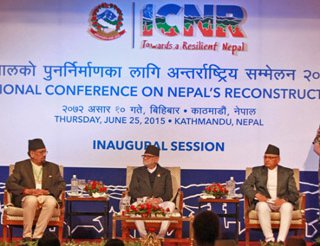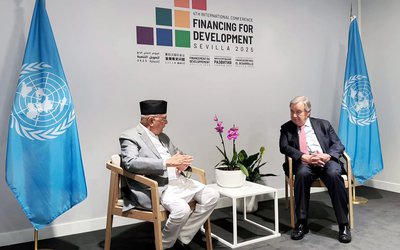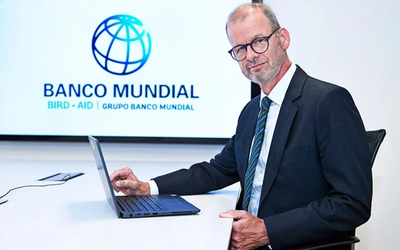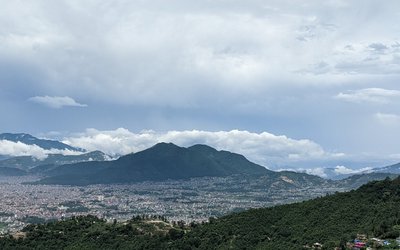
Although foreign ministers from India and China strongly expressed their stands to work together in Nepal’s reconstruction efforts, the demand by India for a place for its interpreters at par with that given to China indicated that differences as well as agreements exist between the two neighbors with respect to Nepal’s affairs.
India and China pledged over 1.5 billion dollars for Nepal. The Asian giants, whose aid outweighed that by the Western donors and the multilaterals, tried to help Nepal come back on its feet and expand their influence in the buffer state.
India offered $1 billion. Foreign Minister Sushma Swaraj announced at the conference that a quarter would be in the form of grants and the rest would be loans.
Nepal’s two giant neighbors have historically vied for influence in the landlocked Himalayan nation and both were heavily involved in post-quake rescue and relief efforts. The high level delegations at the recently-held International Conference on Nepal showed this involvement.
Indian expert Rajiv Sharma argues that Indian Prime Minister Narendra Modi has been wooing Nepal since he took office a year ago, as fears have grown that years of neglect and minor disputes with India have given China a chance to make inroads into Nepal. "The relationship between India and Nepal is as old as history itself. We share ties of culture, religion, tradition, language, literature and mythology," Swaraj said.
In the same spirit, as shown by Indian foreign minister Swaraj, Chinese Foreign Minister Wang Yi pledged $483 million in grants to rebuild Nepal after the quake, saying it wanted to focus on the country's sustainable development. With abolition of monarchy in 2008, the Chinese have come up with a new strategic partnership in the new political environment.
"China will help Nepal in every way it can to promote its socio-economic development," said Wang. “China and Nepal are linked by rivers and mountains.” Including non-grant aid, Wang said, “altogether 4.7 billion RMB will be put into five major areas.”
The Chinese foreign minister said, "The assistance will mainly focus on infrastructure, resettlement of mountain people, culture, renovation and disaster preparedness."
He also announced a list of proposals to help Nepal with its industry, sustainable development and social and economic transformations.
This showed that both India and China have strategic interests in Nepal as well. In diplomacy, strategic interests prevail over humanitarian concerns. In this scenario, any friction can change the whole scenario of current level of cooperative relations.
This is not the first time Indians and Chinese are competing in Nepal. Published in 1968, a book by Eugne Bramer Mihaly, Foreign Aid and Politics in Nepal, notes that India was active to exclude Chinese influence, as the United States, with differences in the modality.
Looking at the present scenario, nothing seems to have changed much on the matter of foreign aid politics in Nepal. Unlike in 1968, India is now even making efforts to bar western countries and Americans to get involved in Nepal on their own. Although officially denied, reports said that Nepal government gave no permission to use British Helicopters in rescue operations due to the Indian pressure.
Western Support
Unlike in the cold war period, the support by western countries is directed to humanitarian areas, and they have very little security and strategic interests. Thus, the support is stable and durable. Nepal needs support from Europe, including Britain, Germany and the United States for a long and sustainable development.
Germany has expertise in heritage conservation in Nepal, like none others have. Similarly, DFID and the United States of America both know the weaknesses and lapses in Nepal’s health, agriculture, infrastructure, disaster management and deficit in democratic institutions.
However, the recent policies including the unaccountable mechanism at the grass root level have made western countries unhappy. At a time when Nepal’s traditional development partners have been, in one or the other way, showing reluctance in their entry, Nepal’s largest donor Japan sent a high level delegation led by State Minister for Foreign Affairs Minoru Kiuchi. Similarly, Norway also sent foreign minister to lead its delegation. European Union’s delegation was led by European Commissioner for International Cooperation and Development, Neven Mimica.
Britain, Nepal’s oldest friend, has regularly sent a ministerial level representation in any International Conference on Nepal and the United States has often been represented by senior state department officials, at least at the level of under-secretary, represented by the ambassadors.
Although Nepal can take a lot of benefits from its two neighbors, the western support cannot be substituted by any other, as the western moral support is important for Nepal’s independence. Britain strongly backed Nepal's independence for a long time in international affairs. As Nepal's trade deficit with both the neighbors continues to increase, Nepal needs western market to sell its traditional products and achieve some balance.
UK International Development Secretary Hon Justine Greening said, “Thousands of people remain homeless or cut off in mountainous areas following the recent earthquakes in Nepal. Hospitals and schools have been destroyed, and people’s livelihoods torn apart. Now the monsoon season threatens to make the situation even worse.
“When I visited Nepal recently I was struck by the determination of the Nepalese people I met to get their lives back on track and Britain will continue to help them do this. That means redoubling our efforts to help Nepal and its people rebuild hospitals, reclaim livelihoods and protect the most vulnerable, including women and girls.”
Nepal’s Satisfaction
Despite the absence of high level delegations from the west, earthquake-hit Nepal had reasons to rejoice as it received pledges of aid worth $4.4 billion or two-thirds of the amount needed over five years for reconstruction.
“The conference is a grand success to raise funds,” thundered Finance Minister Dr. Ram Sharan Mahat. “The total pledge made today was $4.4bn, which was more than expected with $2.2bn in loans and $2.2bn in grants.”
"Nepal and concerned donors will have to negotiate the details of the projects, timeframe and modalities of aid. Only after that the money will come and project implementation will begin," Dr. Mahat told the media at the end of the conference attended by delegates from 60 countries and aid agencies.
Japan pledged a financial assistance of $260 million, while the US and the UK expressed commitment to extend $130 million and $110 million, respectively. The European Union pledged a grant assistance of around $112 million.
Multilateral lending agencies that have been supporting Nepal also made generous commitments during the conference. The Asian Development Bank, for instance, pledged to extend $600 million, the World Bank pledged to provide $500 million and the International Monetary Fund expressed commitment to extend $50 million.
Among others, countries like Germany, Switzerland, Norway, South Korea, Finland, Turkey, Israel, Sri Lanka, Bangladesh and Pakistan also pledged financial assistance to Nepal.
Two quakes, on April 25 and May 12, killed 8,832 people, injured more than 22,000 and forced tens of thousands into temporary shelters. The government has estimated the cost of recovery at over $6.6 billion, equivalent to one third of its gross domestic product. The government says the earthquake destroyed more than 500,000 houses and pushed 700,000 more people to poverty.
Zero Tolerance
As Nepal hailed the gesture from the international community, led by India and China, for surpassing expectations and pledging $4.4bn for reconstruction, Prime Minister Sushil Koirala vowed “zero tolerance” of corruption and expressed strong commitment that all aid would go to victims.
“We will share periodically the use of the funds to maintain transparency because you are accountable to your own citizens,” said Prime Minister Koirala addressing the conference. “I assure you that we will leave no stone unturned in ensuring that the support reaches the intended beneficiaries,” said Prime Minister Koirala.
As pledges rolled in, the international community said it was crucial to ensure the money was spent well. “Money will be important for building back a more resilient Nepal but it’s not just about money,” said World Bank president Jim Yong Kim in a video message to delegates. “Just as important is how these funds are spent.”
As foreign donors and agencies pledged more than 4 billion dollars in aid for Nepal to support its post-earthquake reconstruction, the government sought to assure would-be contributors that the funds would be used effectively.
Commitments Galore
Japan’s foreign minister Minoru Kiuchi said his country “will implement assistance of $300mn as its support” to meet the needs outlined in the recent assessment by the Nepal government. “The first area of focus is schools, as over 7,000 schools are affected,” he said.
Japan “will work with Asian Development Bank to rebuild schools to enable children to return to school and protect them from future earthquakes”.
Japan would also work with the World Bank “to build houses that meet earthquake resistant standards”, and with UNESCO to rebuild the world heritage sites that had been damaged by the earthquake, he said.
Additional pledges of $600 million from the Asian Development Bank, $260 million from Japan, $130 million from the US, $100mn from the EU, $58mn from Britain poured in through the day, supplementing an earlier offer of up to $500mn from the World Bank.
Norway pledged 30mn in total assistance. “As we move from disaster relief to reconstruction, humanitarian aid must pave the way for a long-term development,” Norwegian finance minister Borge Brende said.
US businesses had privately donated more than $20million,"said Ambassador Peter W Bodde. “US NGOs have given over 150MN.”
The Asian Development Bank (ADB) was “providing Nepal total grant assistance of $600mn for reconstruction,” said President Takehiko Nakao. “The remaining challenges are immense due to the remoteness of the affected areas and the monsoon is already setting in.”
The ADB had already announced $200mn for earthquake emergency assistance to restore schools and other buildings immediately after the earthquake. European Commissioner for Development Neven Mimica said the EU is preparing a grant operation support of 100mn Euros. “This is our pledge. In addition, we will make available 5millin Euros for technical assistance for those hardest hit by the earthquake,” said Mimica.
Finance ministers from Bangladesh, Bhutan and Sri Lanka attending the conference also voiced their long-term support to Nepal. “We have come ahead to help with whatever assistance you can give a friend in times of need,” said Abudul Mahaal A Muhith, the finance minister of Bangladesh.
Israel sent a delegation under its representative ambassador Gill Haskel, head of Israel’s Agency for International Development Cooperation (MASHAV). Haskel pledged to provide support to Nepal. Republic of Korea also sent a team to take part in the conference. Canada also announced additional money.
Concern Over Utilization
As the commitments have already been made by various countries, experts, however, are concerned about the capacity of Nepal government to spend the money. Chandan Sapkota, an economist at the Asian Development Bank who is based in Nepal, said concerns remained over the capacity of the Nepalese government, mired in bureaucratic delays, to use the aid effectively.
Although the government announced to set up a new autonomous authority to oversee the spending of donated reconstruction funds, it has not yet provided a road map for how the authority would operate. “We need a plan from the government that we can spend the money within four to five years,” said Sapkota said.
Sapkota said the donors had played their part and they have pledged a lot of money. Now, it’s up to the government to spend it.
With the past experience of spending development expenditure below 15 percent, Nepal needs to enhance its capability. Similarly, Nepal also needs to show that the money will be spent with better controls.
Although Nepal has successfully hosted the first international conference, it needs to work diplomatically to bring back Nepal's traditional western development partners in the process of reconstruction along with its two neighbors

Keshab Poudel
Poudel is the editor of New Spotlight Magazine.
- FOURTH PROFESSOR Y.N. KHANAL LECTURE: Nepal-China Relations
- Jun 23, 2025
- Colonel JP CROSS: Centenary Birthday
- Jun 23, 2025
- REEEP-GREEN: Empowering Communities with MEP
- Jun 16, 2025
- BEEN: Retrofitted For Green
- May 28, 2025
- GGGI has been promoting green growth in Nepal for a decade: Dr. Malle Fofana
- May 21, 2025















